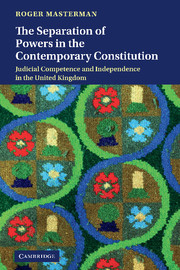 The Separation of Powers in the Contemporary Constitution
The Separation of Powers in the Contemporary Constitution Book contents
- Frontmatter
- Contents
- Acknowledgements
- Table of cases
- Introduction
- PART I Separation of powers, the Human Rights Act and the European Convention on Human Rights
- 1 A doctrine of uncertain scope and application
- 2 The Human Rights Act 1998 and the separation of powers
- 3 The Strasbourg influence
- PART II Judicial engagement with the ‘political’ branches
- PART III The creative powers of courts
- PART IV The separation of the judicial branch
- Select bibliography
- Index
1 - A doctrine of uncertain scope and application
from PART I - Separation of powers, the Human Rights Act and the European Convention on Human Rights
Published online by Cambridge University Press: 10 January 2011
- Frontmatter
- Contents
- Acknowledgements
- Table of cases
- Introduction
- PART I Separation of powers, the Human Rights Act and the European Convention on Human Rights
- 1 A doctrine of uncertain scope and application
- 2 The Human Rights Act 1998 and the separation of powers
- 3 The Strasbourg influence
- PART II Judicial engagement with the ‘political’ branches
- PART III The creative powers of courts
- PART IV The separation of the judicial branch
- Select bibliography
- Index
Summary
The meaning(s) and aim(s) of separation of powers
The meanings and requirements of the separation of powers doctrine have been debated perhaps more than those of any comparable constitutional principle or theory; indeed, ‘few doctrines have been subject to more damning and repeated criticism than that to which the separation of powers has been subject’. In his book, Constitutional Theory, Geoffrey Marshall's famous dissection of the separation of powers concluded that so many were the potential interpretations and requirements of the doctrine, that ‘it may be counted little more than a jumbled portmanteau of arguments for policies which ought to be supported or rejected on other grounds’.
Nowhere, perhaps, has the debate over the meaning, or indeed relevance, of the separation of powers been more heated than in Britain, and more recently, the United Kingdom (UK). At the very best, assessments of the relevance of the separation of powers doctrine have been Janus-like; at worst, they have provoked bouts of academic mud-slinging. In the third edition of his text, Constitutional and Administrative Law, Professor De Smith wrote that ‘no writer of repute would claim that [the separation of powers] is a central feature of the modern British constitution’, presumably condemning M. J. C. Vile to that dubious accolade after he had written ten years earlier that, ‘an approach to the study of British government that rules out reference to the “separation of powers” is an inadequate one’.
- Type
- Chapter
- Information
- The Separation of Powers in the Contemporary ConstitutionJudicial Competence and Independence in the United Kingdom, pp. 9 - 32Publisher: Cambridge University PressPrint publication year: 2010


